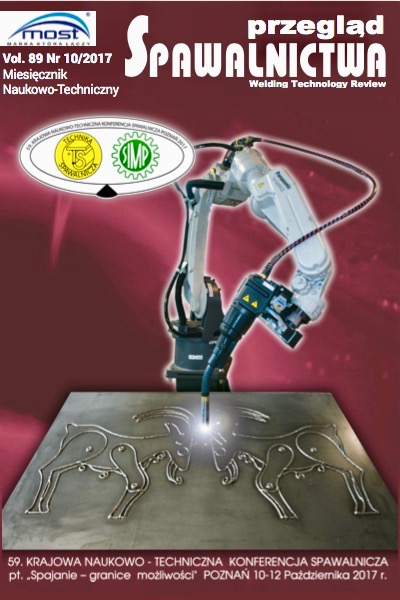Laser technologies in automotive industry on the example of Volkswagen company
Main Article Content
Abstract
Nowadays more and more conventional jointing methods used in an automotive industry like a resistance welding or MIG/MAG welding are replaced by laser techniques. This article presents some examples of modern laser technology used during production of the new model of Volkswagens Crafter in the factory located in Września. In the above article construction and theoretical background of an action of ber lasers as well as characteristics of laser welding and braze welding processes were discussed. Also the results of mentioned techniques used during the bonding of body sheets were presented.
in polish
Zastosowanie technologii laserowych w branży motoryzacyjnej na przykładzie firmy Volkswagen Poznań
W przemyśle motoryzacyjnym coraz częściej konwencjonalne metody spajania, takie jak zgrzewanie oporowe czy spawanie MIG/MAG, zastępowane są technologiami laserowymi. Artykuł prezentuje przykłady zastosowania nowoczesnych technologii laserowych do produkcji nowego Volkswagena Craftera we Wrześni. Omówione w nim zostały budowa i podstawy działania laserów włóknowych, rozróżnienie laserów emitujących wiązkę pojedynczą i potrójną, a także charakterystyka procesów spawania i lutospawania laserowego. Przedstawione zostały również rezultaty wykorzystania opisanych technologii do spajania blach karoseryjnych.
Downloads
Article Details
Creative Commons CC BY 4.0 https://creativecommons.org/licenses/by/4.0/
Welding Technology Review (WTR) articles are published open access under a CC BY licence (Creative Commons Attribution 4.0 International licence). The CC BY licence is the most open licence available and considered the industry 'gold standard' for open access; it is also preferred by many funders. This licence allows readers to copy and redistribute the material in any medium or format, and to alter, transform, or build upon the material, including for commercial use, providing the original author is credited.
References
Majumdar J. D., Manna I.: Laser material processing, International Materials Reviews, 56, s. 46-47, 2011.
Limpert J. , Schreiber T., Tünnermann A.: Fiber based high power laser systems, s. 1-6, www.rp-photonics.com/highpower berlasers.html (odwiedzona 30.08.2017)
Katayama S.: Introduction: fundamentals of laser welding, Handbook of laser welding technologies, Joining and Welding Research, Institute Osaka University, 11-1 Mihohaoka, Ibaraki, Osaka, Japonia, pp. 3-7, 2013.
Dobrzański L.A., Dobrzańska-Danikiewicz A.D.: Obróbka powierzchni materiałów inżynierskich, Open Access Library, Volume 5, s. 183-193, 2011.
Różański M., Morawiec M., Grajcar A., Stano S.: Modi ed twin-spot laser welding of complex phase steel, Arch. Metall. Mater, Vol. 61, pp. 1999, 2016.
K-M. Hong, Y.C. Shin: Prospects of laser welding technology in the automotive industry: A review, Journal of Materials Processing Technologies, 245, pp. 52, 2017.
Majeran E.: Lutowanie laserowe w przemyśle motoryzacyjnym metodą Trifocal na przykładzie tylnej klapy Volkswagena Caddy, Przegląd Spawalnictwa, Vol. 88, Nr 9, s. 14-17, 2016.
Krastel K.: New production tool for energy-e cient joining technology in automotive manufacturing, Sheet Metal Welding Conference XVI, Octo- ber 22-24, 2014.
Norma PN-EN 60825-1 Bezpieczeństwo urządzeń laserowych Część 1. Klasy kacja sprzętu i wymagania, 2010.
DIN EN ISO 13919-1 Schweißen - Elektronen- und Laserstrahl-Schweißverbindungen; Leitfaden für Bewertungsgruppen für Unregelmäßigkeiten - Teil 1: Stahl, 2002.
